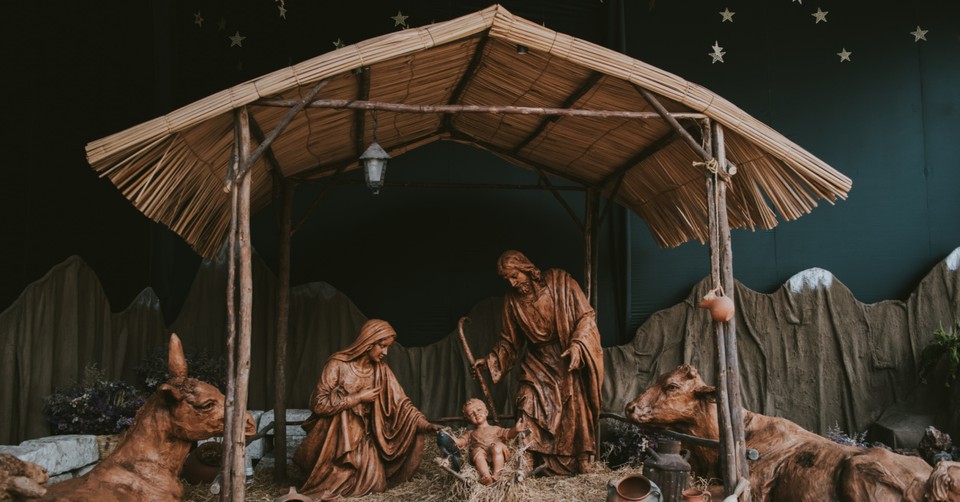How the “Word Became Flesh” Changed Everything

Jesus’ entrance into the world changed everything. His birth divided time. His earthly life is the nexus of all that came before and all that proceeded after extended beyond us to His return. There is an incredible depth of meaning bound up in the phrase “and the Word became flesh,” but churchgoers hear it so often we seldom stop to truly absorb what it means.
The prophets of old would have looked on modern Christians with great longing because they rested their hope on the coming Messiah. The further humanity travels from the pivot point of the cross, the less we appreciate what life was like before Jesus arrived compared to after His resurrection. Essentially, we should begin every day with a sense of great blessing that we were assigned to live in the days following the “Word became flesh.”
There are two words in the Greek used to refer to the Word of God: rhema and logos. Rhema references the message of God or specific understandings opened to us by the work of the Holy Spirit.
So, in Luke 3:2 ESV we have an example of rhema, a specific message for a specific human: “while Annas and Caiaphas were high priests, the word of God came to John the son of Zacharias in the wilderness.” Similarly, rhema is used in Mark 17:72 ESV, “A second time the rooster crowed. Then Peter called to mind the word that Jesus had said to him, ‘Before the rooster crows twice, you will deny Me three times.’ And when he thought about it, he wept.” Again, note the specific messaging. We generally refer to rhema when we reference someone gaining a personal and deep understanding of God’s Word in a way that changes them.
Logos has a broader meaning. It is the totality or general message, the full expression of God’s utterances to humanity. This is the term used in 2 Timothy 2:15 ESV “Be diligent to present yourself approved to God, a worker who does not need to be ashamed, rightly dividing the word of truth.” And, more importantly for this article, it’s the word John used when he wrote “and the Word became flesh” in John 1:14.
Jesus is the full expression, the embodiment, of what God desires to communicate about Himself to us. The writer of Hebrews 1:3 ESV captures it this way, “He is the radiance of the glory of God and the exact imprint of his nature, and he upholds the universe by the word of his power. After making purification for sins, he sat down at the right hand of the Majesty on high.” Jesus is God’s Word embodied. While before Christ, we followed what we understood of the law and the prophets, now we follow Jesus – a living, breathing person – fully God and fully human.
Every effort of modern culture to elevate the discussion of God while simultaneously dismissing Jesus as central to that conversation misses God’s point entirely. Jesus is the full expression of God to us.
Context: What Yahweh Worship Was Like Before
Prior to Christ coming in the flesh, God’s people relied on the Law and the Prophets to structure their worship of Yahweh. The Lord created a system of sacrifices, feasts, music, and offerings overseen by the Levitical priests. People would gather at prescribed times in set places (John 4:20) to offer animal sacrifices for their sins and to be led in worship by the priests of Aaron.
Sacrifices were not lasting and did not cover all sins, so they had to be offered again and again. They could not be offered by just anyone (1 Samuel 13:8-15) but only by the appointed priests or by the instruction of a prophet of God (2 Samuel 24:18-19). There were strict instructions about how close Gentiles, Jewish women, those deemed unclean, and even men who were not of the priesthood could be to the Holy of Holies where God dwelled. And the Holy Spirit was not available to all, God sending His Spirit only to certain individuals, and could be withdrawn from a person at any time (1 Samuel 16:14).
In a system devised to be overseen by rabbis, religious leaders, and priests, the people were at the mercy of often corrupt men. The Pharisees created a “hedge” around the laws of God, making them stricter and enforcing them inconsistently.
Jeremiah and Ezekiel spoke out against this corruption in Jeremiah 5:31 NKJV “The prophets prophesy falsely, And the priests rule by their own power; And My people love to have it so. But what will you do in the end?” and Ezekiel 22:26 NKJV “Her priests have violated My law and profaned My holy things; they have not distinguished between the holy and unholy, nor have they made known the difference between the unclean and the clean; and they have hidden their eyes from My Sabbaths, so that I am profaned among them.”
When “the Word became flesh,” Jesus announced a radical change in our relationship with and worship of God. He threw the moneychangers out of the temple saying, “It is written, ‘My house shall be called a house of prayer,’ but you make it a den of robbers” (Matthew 21:13b). In speaking with the woman at the well He said, “Woman, believe me, the hour is coming when neither on this mountain nor in Jerusalem will you worship the Father” (John 4:21b ESV) and “But the hour is coming, and is now here, when the true worshipers will worship the Father in spirit and truth, for the Father is seeking such people to worship him. God is spirit, and those who worship him must worship in spirit and truth” (John 4:23-24 ESV).
God’s desire has been from the beginning and will be stretching into eternity to be in a relationship with humanity. Prior to the Fall, Adam and Eve walked with God in the Garden of Eden. When sin entered the world, they hid from Him. When God spoke with the Jews at Mount Sinai in Exodus 19 and 20, they pleaded for Him to speak only with Moses (Exodus 20:19) because His voice was too much for them to bear. When “the Word became flesh,” however, we were once again able to walk with God and to hear His voice, and to worship Him in spirit and truth.
This is why the writer of Hebrews references that moment on Sinai in Hebrews 12:18-24. The writer tells us that we have not come to “a blazing fire and darkness and gloom and a tempest and the sound of a trumpet and a voice whose words made the hearers beg that no further messages be spoken to them.” (Hebrews 12:18b) Instead, we have come to “Mount Zion and to the city of the living God, the heavenly Jerusalem, and to innumerable angels in festal gathering” (Hebrews 12:22b).
1. The New Covenant
The Hebrew writer finishes the passage in chapter 12 by announcing that Jesus has ushered in a new covenant (Hebrews 12:24). There are five Biblical covenants or strong, unbreakable agreements God made with His people: the Noahic covenant, the Abrahamic covenant, the Mosaic covenant, the Davidic covenant, and the New Covenant. We hear the words of Jesus whenever we celebrate communion, “Likewise He also took the cup after supper, saying, “This cup is the new covenant in My blood, which is shed for you” (Luke 22:20 NKJV). The Old Testament covenants (Noahic through Davidic) all look forward to the coming Messiah. “When the Word became flesh,” He became the fulfillment of all that was promised so that the New Testament is devoted to demonstrating all the ways Jesus was the fulfillment for which the world had been waiting.
Hebrews 1:1 ESV says “God, who at various times and in various ways spoke in time past to the fathers by the prophets, has in these last days spoken to us by His Son, whom He has appointed heir of all things, through whom also He made the worlds.” This is why we should celebrate daily that in His kindness, He chose us for these times.
2. Open to Gentiles
When “the Word became flesh” Jesus opened the door of salvation to the Gentiles. Where previous to His coming, we would have been relegated to the outer courts of the temple and restricted in our worship, following Christ, we are free to worship at His feet.
Paul was nearly killed for preaching that Christ’s sacrifice made a way for Gentiles. He testified before King Agrippa in Acts 26:22-23 NKJV saying, “Therefore, having obtained help from God, to this day I stand, witnessing both to small and great, saying no other things than those which the prophets and Moses said would come— that the Christ would suffer, that He would be the first to rise from the dead, and would proclaim light to the Jewish people and to the Gentiles.” In Christ, there is “neither Jew nor Greek” according to Galatians 3:28.
God was not done with His people, but Jesus’ death and resurrection created a path of salvation for people from every nation, tribe, people, and language (Revelation 7:9).

Photo Credit: ©Getty Images/kevron2001
3. The Holy Spirit
The prophet Joel, looking forward to the coming Messiah, prophesied “And it shall come to pass afterward that I will pour out My Spirit on all flesh” (Joel 2:28). Peter quoted this verse in his sermon at Pentecost when the Holy Spirit descended on the church in Acts 2:16-21. John the Baptist proclaimed that Jesus would baptize us with fire and the Holy Spirit (Luke 3:16) and Jesus promised that when He went away, He would send His Holy Spirit to be with us (John 16). Jesus said it was to our advantage that He ascends to the Father and sends us the presence of the Holy Spirit. We are sealed by the Holy Spirit and can be filled with the Holy Spirit whose presence remains with us because “the Word became flesh.”
4. A God Who Can Sympathize
And when “the Word became flesh” we were freed from a corrupt, tyrannical priesthood to Jesus, our high priest who “sympathize with our weaknesses, but was in all points tempted as we are, yet without sin” Hebrews 4:15b NKJV. Jesus described Himself as “gentle and lowly of heart” in Matthew 11:29 NKJV. He is full of compassion and we can bring to Him every concern, temptation, and trial that affects us without fear of condemnation because “there is, therefore now, no condemnation for those who are in Christ Jesus” Romans 8:1 ESV.
In fact, Jesus has made us “a royal priesthood” (1 Peter 2:9 ESV) after Himself.
Paul tells us in Colossians 1:19 that it pleased the Father that in Jesus “all the fullness should dwell.” And that by Him all things are reconciled to the Father. He was with God in the beginning at the creation of the earth and His coming in the flesh was pivotal to bring about our freedom from sin and to give us eternal life.
When “the Word became flesh” the kingdom of God came to us and when we enter into a relationship with Jesus, we become citizens, not of this world, but of His kingdom come. We could spend the rest of our days until His return exploring and wondering at all that His coming in the flesh accomplished. It should fill us with a sense of blessing and awe every day that we’re privileged to live on this side of the birth, death, and resurrection of Jesus.
This Word become flesh will have the final word on all our lives. May the final Word on all our lives be Jesus.
Photo Credit: ©Walter Chavez/Unsplash
Originally published March 08, 2021.






